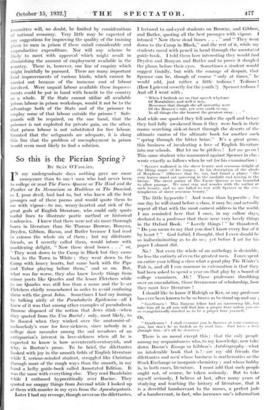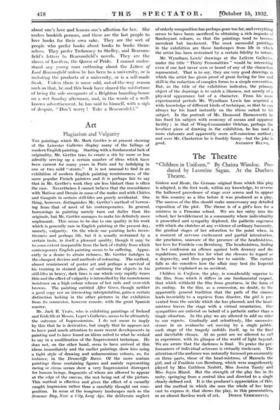So this is the Pierian Spring ?
BY SEAN O'FAOLAIN.
IN my undergraduate days nothing gave me more annoyance than 'to met t men who had never been to college or read The Faerie Queene or The Hind and the Panther or In Memoriam or Hudibras or The Dunciad, as I, poor devil, had had to, but who knew all the best passages out of these poems and would quote them to me with vigour—to me, weary-hearted and sick of the great gods of English literature, who could only quote useful lines to illustrate poetic methOd or historical tendencies. I knew that there were not six more thorough bores in literature than Sir Thomas Browne, Bunyan, Dryden, Gibbon, Bacon, and Butler because I had read in extenso the whole six of them ; but my dilettante friends, as I secretly called them, would intone with maddening delight, " Now these dead bones . . ." or, `` They went down to the Camp in Black but they came hack to the Town in 'White ; they went down to the Camp with heavy hearts, but came back with the Pipe and Tabor playing before them," and so on. But, what was far worse, they also knew lovely things from minor poets like Quarles and the lesser Fletchers while to me Quarles was still less than a name and the lesser Fletchers chiefly remembered in order to avoid confusing them with the great John. Sometimes I had my innings by talking airily of the Pseudodoxia Epidemica—all I knew of it was that among other examples of pseudodoxia Browne disposed of the- notion that Jews stink—when they quoted from the Urn Burial ; only, most likely, to he floored when they winked over the anatomist-of- melancholy's cure for love-sickness, since nobody in a college dare meander among the sad meadows of an antiquarian's interest in love-sickness when all he is expected- to know is how seventeenth-centuryish, and why, is Burton's prose. To be brief, the dilettantes basked with joy in the smooth fields of English literature while I, serious-minded student,' struggled like Christian through more of the rough ways than the smooth, in my hand a hefty guide-book called Annotated Edition. It was the same with everything else. They read Baudelaire while • I enthused hypocritically over Racine. They quoted me snappy things from Juvenal while I looked up at them with murder in my eyes from the Apocolocyiztosis.
Later I-had my revenge, though never on the dilettantes. I lectured to sad-eyed students on BrOliiI1C, and Gibbon, and Butler, quoting all the best passages with vigour. I intoned " Now these (lead bones - . " and " They went doWn to the Camp in Black," and the rest of it, while my students raced with pencil in hand through the annotated guide-book. I told them how interesting they.would find Dryden and Bunyan and Butler and to prove it dangled the plums before their eyes. Sometimes a student would suggest timidly, but with the courage of despair, that Spenser can be, though of course " only at times," he would add, just rather a little tedious ? Tedious ! (How I grieved secretly for the youth !) Spenser tedious ? And off I 'went with :
" When I bethink mo on that speech whyleare Of Mutabilitie, and well it wey, Meseemes that though she all unworthy were
Of the Heaven's ride, yet very sooth to say,-
In all things else she boarest the greatest sway. . . "
And while one quoted they fell under the spell and before they had fully awakened from it they were back in their rooms searching sick-at-heart through the deserts of the ultimate cantos of the ultimate book for another such " spring through the bitter brine." It's a great game, this business of inculcating a love of English literature into our schools. But let me be pitiless ! Let me go on ! This same student who murmured against Spenser in clas.; wrote exactly as follows when he sat for his examination :
" Spenser wallowed in the sheer beauty and sensuous delight of the lilting music of his images. In his description of the abode of Morpheus " (Observe that he, too, had found a plum) " the very leaves stand out quivering in the sunlight and waving in the breeze. The sweet poetry of The Faerie Queene is too beautiful to allow passage. We must stay and wonder with the author at such beauty, and we are lulled to rest with Spenser in the con- templation of sheer sensuous beauty."
The little hypocrite ! And worse than hypocrite ; for one day he will stand before a class, it may be, and actually repeat all that with the most earnest address in the world. I am reminded here that I once, in my callow days,. declared to a professor that there were very lovely things in the Oxford Book. " Lovely things ! " he thundered. " Do you mean to say that you don't know every line of it by heart ? " God forbid, I thought, that I ever should be so indiscriminating as to do so ; yet before I sat for his paper I almost did.
No ! Not even the whole of an anthology is desirable, far less the entirety of even the greatest men. I once spent an entire year telling a class what a good play The Winter's Tale is, and all I can murmur in extenuation is that they had been asked to spend a year on that play by a board of college examiners. Ali ! Those professors throbbing over an emendation, those freemasons of scholarship, how they must love literature !
I should like to know if Raleigh or her, or any professor • has ever been known to be so brave as to stand up and say
" Gentlemen ! This Bunyan fellow had an interesting life, but take him all in all you will find him a proper bore unless you are so evangelistically-minded as to be a proper bore yourself."
Or,
" gentlemen ! I shall examine you in Spenser at your exatnina• tion, but don't be so foolish as to read him. Just have a look through him—it's all ho deserves."
There is no moral except this ; that the only people among my acquaintances who, to my knowledge, now take down Baeon's EssayS or Gibbon's Autobiography—what an intolerable book that is !-are my old friends the dilettantes and med whose business is mathematics or the Stock Exchange or inorganic chemistry ; and whose hobby is, in both cases, literature. I must add that such people ought not, of course, be taken seriously. But to take myself seriously, I believe at last, 'after many years of studying and teaching the history of literature, that it is a -deceitful handservant to the muses, *a perfect jade of a handservant, in fact, who increases one's information about one's love and lessens one's affection for her. She makes bookish persons, and these arc the last people to love books for their own sake. They are the sort of people who prefer books about books to books them- selves. They prefer Trelawney to Shelley, and Beacons- field's letters to Beaconsfield's novels. They are the slaves of Lucifers., the Queen of Pride. I cannot under- stand any young man enthusing about the Letters of Lord Beaconsfield unless he has been to a university, or is . imitating the products of a university, or is a self-made freak. Unless there is some odd, out-of-the-way reason such as that, he and this book have shared the misfortune of being the sole occupants of a Brighton boarding-house on a wet Sunday afternoon, and, in the words of a well- known advertisement, he has said to himself, with a sigh of despair, " Don't worry ! Take a Bcaconsfiel 1."



























































 Previous page
Previous page